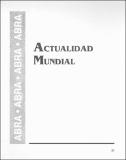| dc.contributor.author | Lagarde, Marcela | |
| dc.date.accessioned | 2020-11-11T00:52:33Z | |
| dc.date.available | 2020-11-11T00:52:33Z | |
| dc.date.issued | 1993-12 | |
| dc.identifier.issn | 2215-2997 | |
| dc.identifier.other | https://www.revistas.una.ac.cr/index.php/abra/article/view/4400/4230 | |
| dc.identifier.uri | http://hdl.handle.net/11056/18633 | |
| dc.description.abstract | Durante casi cinco años, el Tratado' de Libre Comercio fue usado por el gobierno mexicano como la panacea para resolver en el futuro los problemas del desarrollo en México. Para el gobierno, afirma del tratado rubricaría su política de adelgazamiento del Estado y su impulso neoliberal. Por décadas y de manera intensificada en los últimos años, millones de mujeres y hombres vieron descender su nivel de vida y diversificar las formas de
explotación económica, de opresión cultural y de marginación política que la sociedad y los grupos hegemónicos ejercen sobre ellos. Parecía que la sociedad mexicana era capaz de tolerar eso y mucho más y que el gobierno y algunos estamentos modernos podrían signar ese tratado como símbolo de la entrada del
país al mundo del desarrollo y de la modernidad.
En ese ambiente, hace unos meses, el gobierno informó que habían bajado los niveles de pobreza y de extrema pobreza en México. Va sólo estaban en condiciones de pobreza algunas decenas de millones de personas, pero eso para los funcionarios era únicamente un mal menor. Sin embargo, el primer día de
enero de 1994 un grupo de insurgentes indígenas del estado de Chiapas se alzó en armas y declaró la guerra al gobierno a través de un comunicado suscrito desde la Selva Lacandona bajo la consigna: ¡Ya basta! | es_ES |
| dc.description.abstract | For almost five years, the Free Trade Agreement' was used by the Mexican government as a panacea to solve Mexico's future development problems. For the government, he claims that the treaty would underscore its policy of downsizing the state and its neoliberal drive. For decades and intensified in recent years, millions of women and men saw their standard of living decline and diversify
economic exploitation, cultural oppression and political marginalization that the society and the hegemonic groups exercise over them. It seemed that society Mexican was able to tolerate that and much more and that the government and some modern states could sign that treaty as a symbol of the entry of the
country to the world of development and modernity.
In that environment, a few months ago, the government reported that poverty levels and extreme poverty in Mexico had dropped. Only a few tens of millions of people were in poverty, but for the officials this was only a lesser evil. However, on the first day of
In January 1994, a group of indigenous insurgents in the state of Chiapas took up arms and declared war on the government through a communiqué signed from the Lacandon Jungle under the slogan: Enough! | es_ES |
| dc.description.sponsorship | Universidad Nacional, Costa Rica | es_ES |
| dc.language.iso | spa | es_ES |
| dc.publisher | Editorial de la Universidad Nacional | es_ES |
| dc.rights | Acceso abierto | es_ES |
| dc.rights.uri | http://creativecommons.org/licenses/by-nc-sa/4.0/ | * |
| dc.source | Revista ABRA Vol. 14, No. 19-20, p. 23-34 | es_ES |
| dc.subject | MUJERES | es_ES |
| dc.subject | REVOLUCIÓN | es_ES |
| dc.subject | REVOLUTION | es_ES |
| dc.subject | IDENTIDAD | es_ES |
| dc.subject | IDENTITY | es_ES |
| dc.subject | INDÍGENAS | es_ES |
| dc.subject | NATIVES | es_ES |
| dc.subject | MÉXICO | es_ES |
| dc.subject | GÉNERO (SEXO) | es_ES |
| dc.subject | WOMEN | es_ES |
| dc.subject | GENDER | es_ES |
| dc.subject | CHIAPAS | es_ES |
| dc.title | Identidad femenina e insurrección en México (Las Zapatistas del EZLN* - 1994) | es_ES |
| dc.title.alternative | Female Identity and Insurrection in Mexico (The Zapatistas of the EZLN* - 1994) | es_ES |
| dc.type | http://purl.org/coar/resource_type/c_6501 | es_ES |
| dc.description.procedence | Escuela de Sociología | es_ES |


